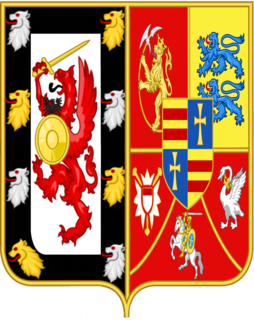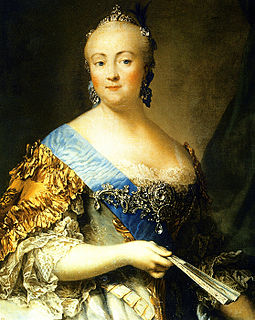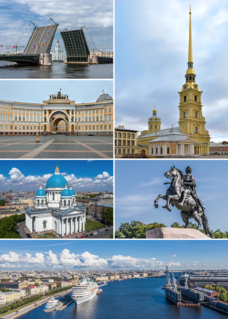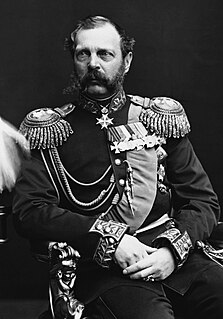
Russia, officially the Russian Federation, is a transcontinental country spanning Eastern Europe and Northern Asia. At 17,125,200 square kilometres (6,612,100 sq mi), it is the largest country in the world by area, covering more than one-eighth of the Earth's inhabited land area, spanning eleven time zones, and bordering 18 sovereign nations. About 146.79 million people live in the country's 85 federal subjects as of 2019, making Russia the ninth most populous nation in the world and the most populous nation in Europe. Russia's capital and largest city is Moscow; other major urban areas include Saint Petersburg, Novosibirsk, Yekaterinburg, Nizhny Novgorod, Kazan and Chelyabinsk.

The House of Romanov was the reigning royal house of Russia from 1613 to 1917.

The Soviet Union, officially known as the Union of Soviet Socialist Republics (USSR), was a federal sovereign state in northern Eurasia that existed from 1922 to 1991. Nominally a union of multiple national Soviet republics, in practice its government and economy were highly centralized. The country was a one-party state, governed by the Communist Party with Moscow as its capital in its largest republic, the Russian Soviet Federative Socialist Republic. Other major urban centers were Leningrad, Kiev, Minsk, Tashkent, Alma-Ata, and Novosibirsk. It spanned over 10,000 kilometers (6,200 mi) east to west across 11 time zones, and over 7,200 kilometers (4,500 mi) north to south. Its territory included much of Eastern Europe, as well as part of Northern Europe and all of Northern and Central Asia. It had five climate zones: tundra, taiga, steppes, desert and mountains.

Catherine II, most commonly known as Catherine the Great, born Princess Sophie of Anhalt-Zerbst, was Empress of Russia from 1762 until 1796, the country's longest-ruling female leader. She came to power following a coup d'état that she organised—resulting in her husband, Peter III, being overthrown. Under her reign, Russia was revitalised; it grew larger and stronger, and was recognised as one of the great powers of Europe.

Elizabeth Petrovna, also known as Yelisaveta or Elizaveta, was the Empress of Russia from 1741 until her death. She led the country during the two major European conflicts of her time: the War of Austrian Succession (1740–48) and the Seven Years' War (1756–63).

Peter the Great, Peter I or Peter Alexeyevich ruled the Tsardom of Russia and later the Russian Empire from 7 May [O.S. 27 April] 1682 until his death in 1725, jointly ruling before 1696 with his elder half-brother, Ivan V. Through a number of successful wars, he expanded the Tsardom into a much larger empire that became a major European power and also laid the groundwork for the Russian navy after capturing ports at Azov and the Baltic Sea. He led a cultural revolution that replaced some of the traditionalist and medieval social and political systems with ones that were modern, scientific, Westernised and based on the Enlightenment. Peter's reforms had a lasting impact on Russia, and many institutions of the Russian government trace their origins to his reign. He is also known for founding and developing the city of Saint Petersburg, which remained the capital of Russia until 1917.

The Great Northern War (1700–1721) was a conflict in which a coalition led by the Tsardom of Russia successfully contested the supremacy of the Swedish Empire in Northern, Central and Eastern Europe. The initial leaders of the anti-Swedish alliance were Peter I of Russia, Frederick IV of Denmark–Norway and Augustus II the Strong of Saxony–Poland–Lithuania. Frederick IV and Augustus II were defeated by Sweden, under Charles XII, and forced out of the alliance in 1700 and 1706 respectively, but rejoined it in 1709 after the defeat of Charles XII at the Battle of Poltava. George I of Great Britain and of Electorate of Hanover joined the coalition in 1714 for Hanover and in 1717 for Britain, and Frederick William I of Brandenburg-Prussia joined it in 1715.

Alexander Sergeyevich Pushkin was a Russian poet, playwright, and novelist of the Romantic era who is considered by many to be the greatest Russian poet and the founder of modern Russian literature.

Paul I reigned as Emperor of Russia between 1796 and 1801. Officially, he was the only son of Peter III and Catherine the Great, although Catherine hinted that he was fathered by her lover Sergei Saltykov.

"The Great Game" was a political and diplomatic confrontation that existed for most of the 19th century between the British Empire and the Russian Empire over Afghanistan and neighbouring territories in Central and South Asia. Russia was fearful of British commercial and military inroads into Central Asia, and Britain was fearful of Russia adding "the jewel in the crown", India, to the vast empire that Russia was building in Asia. This resulted in an atmosphere of distrust and the constant threat of war between the two empires. Britain made it a high priority to protect all the approaches to India, and the "great game" is primarily how the British did this. Historians with access to the archives have concluded that Russia had no plans involving India, as the Russians repeatedly stated.

War and Peace is a novel by the Russian author Leo Tolstoy, published serially, then in its entirety in 1869. It is regarded as one of Tolstoy's finest literary achievements.

The Triple Entente describes the informal understanding between the Russian Empire, the French Third Republic, and Great Britain. It built upon the Franco-Russian Alliance of 1894, the Entente Cordiale of 1904 between Paris and London, and the Anglo-Russian Entente of 1907. It formed a powerful counterweight to the Triple Alliance of Germany, Austria-Hungary, and Italy. The Triple Entente, unlike the Triple Alliance or the Franco-Russian Alliance itself, was not an alliance of mutual defense.

A great power is a sovereign state that is recognized as having the ability and expertise to exert its influence on a global scale. Great powers characteristically possess military and economic strength, as well as diplomatic and soft power influence, which may cause middle or small powers to consider the great powers' opinions before taking actions of their own. International relations theorists have posited that great power status can be characterized into power capabilities, spatial aspects, and status dimensions.

World War I, also known as the First World War or the Great War, was a global war originating in Europe that lasted from 28 July 1914 to 11 November 1918. Contemporaneously described as "the war to end all wars", it led to the mobilisation of more than 70 million military personnel, including 60 million Europeans, making it one of the largest wars in history. It is also one of the deadliest conflicts in history, with an estimated nine million combatants and seven million civilian deaths as a direct result of the war, while resulting genocides and the resulting 1918 influenza pandemic caused another 50 to 100 million deaths worldwide.

The Tsardom of Russia, also called the Tsardom of Muscovy, was the centralized Russian state from the assumption of the title of Tsar by Ivan IV in 1547 until the foundation of the Russian Empire by Peter the Great in 1721.

The Seven Years' War was a global war fought between 1756 and 1763. It involved all five European great powers of the time plus many of the middle powers and spanned five continents, affecting Europe, the Americas, West Africa, India, and the Philippines. The conflict split Europe into two coalitions: one was led by the Kingdom of Great Britain and included the Kingdom of Prussia, the Kingdom of Portugal, the Electorate of Brunswick-Lüneburg, and a few other small German states; while the other was led by the Kingdom of France and included the Austrian-led Holy Roman Empire, including the Electorate of Saxony and most of the smaller German states, the Russian Empire, the Kingdom of Spain, and Sweden. The Dutch Republic, Denmark-Norway, the Italian States, and the Ottoman Empire did not participate. Meanwhile, in India, some regional polities within the increasingly fragmented Mughal Empire, with the support of the French, failed to defeat a British attempt to conquer Bengal.

The Russian Empire was an empire that extended across Eurasia and North America from 1721, following the end of the Great Northern War, until the Republic was proclaimed by the Provisional Government that took power after the February Revolution of 1917.

Saint Petersburg is a city situated on the Neva River, at the head of the Gulf of Finland on the Baltic Sea. With 5 million inhabitants in 2012, it is Russia's second-largest city after Moscow. An important Russian port on the Baltic Sea, it has a status of a federal subject.

Alexander II was the emperor of Russia from 2 March 1855 until his assassination on 13 March 1881. He was also the king of Poland and the grand duke of Finland.
















